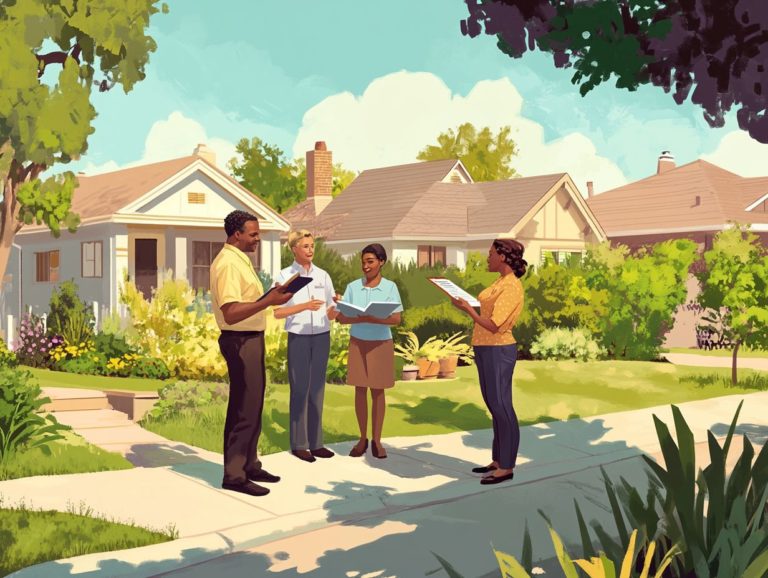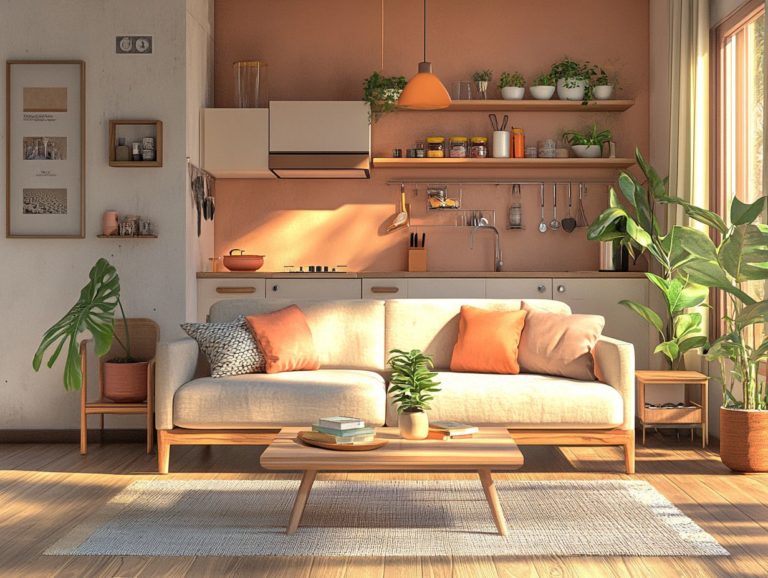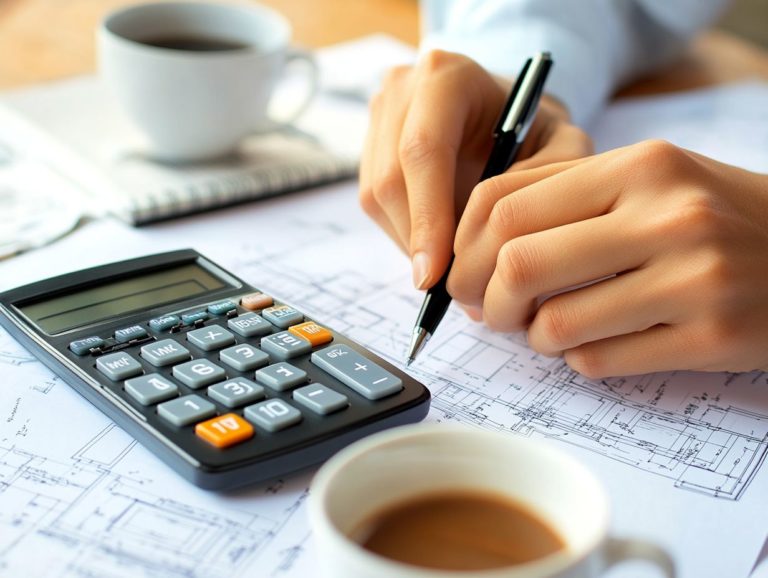5 Key Factors to Consider in a Starter Home
Buying your first home can feel like a thrilling adventure, but it can also feel a bit daunting. Now is the perfect time to dive into the exciting world of home buying! A starter home is your gateway into the housing market, offering a chance to settle in without the overwhelming pressure of searching for your forever residence.
This guide will illuminate five essential factors you should consider:
- Location
- Affordability
- Size and layout
- Potential for future growth
- Resale value
It also covers the advantages and disadvantages of starter homes, highlights their common features, and offers tips to maximize your investment. Whether you’re a first-time buyer or seeking to downsize, this guide is designed to empower you on your journey, ensuring you navigate the process with confidence.
Contents
- Key Takeaways:
- 1. Location
- 2. Affordability
- 3. Size and Layout
- 4. Potential for Future Growth
- 5. Resale Value
- What Is a Starter Home and Why Should You Consider Buying One?
- Frequently Asked Questions
- What are the 5 key factors to consider when looking for a starter home?
- How important is location when choosing a starter home?
- What should I consider for my budget when buying a starter home?
- Why is the size and layout of a starter home important?
- How can I determine the potential for growth in a starter home?
- What amenities should I prioritize in a starter home?
Key Takeaways:
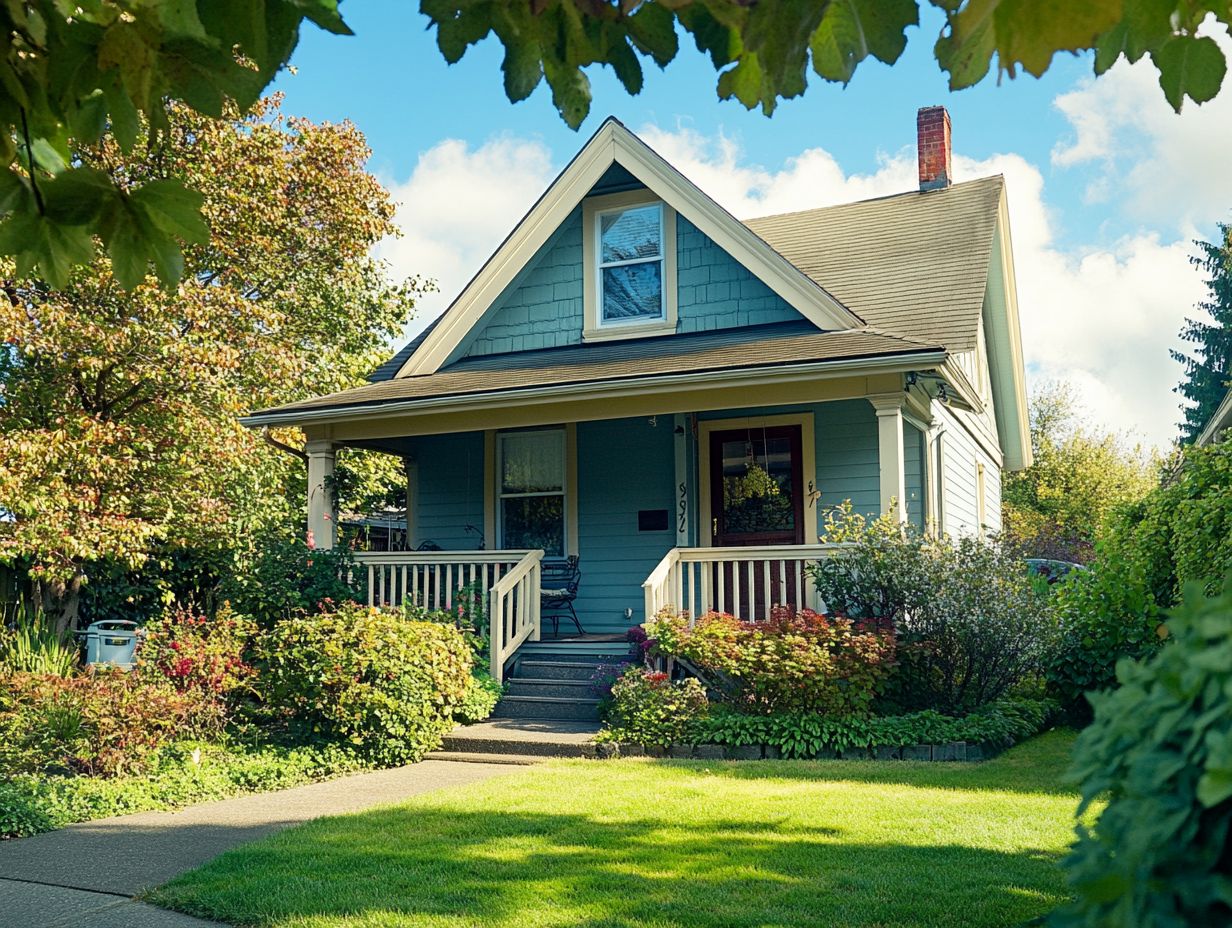
Location is crucial when considering a starter home; be sure to choose a safe neighborhood with good schools and amenities. Additionally, watch out for 5 red flags when buying your first home to avoid potential pitfalls.
Affordability is key make sure the home’s mortgage payments fit your budget and consider potential expenses like property taxes and maintenance.
Size and layout should suit your current needs and future plans think about the potential growth of your family and how the space can be utilized.
Start your home-buying journey today!
1. Location
Selecting the right location for your first home is a crucial decision that includes many factors. Think about community offerings, neighborhood safety, accessibility, and proximity to local amenities each of these elements can profoundly affect your quality of life and shape your long-term plans as a first-time homebuyer.
Consider the role of schools in a neighborhood; they often play a significant part in a family’s choice to settle in a particular area. Access to reliable public transport can improve your daily commute and unlock new job opportunities for you as a future homeowner.
Local amenities think parks, shopping centers, and healthcare facilities add to a vibrant community atmosphere that nurtures social interactions and fosters a genuine sense of belonging.
Evaluating these factors enriches your living experience and enhances the resale potential of your home, as properties in desirable locations tend to maintain or even increase their market value over time.
2. Affordability
Affordability is a crucial factor in your journey to buy a home, especially if you’re a first-time buyer. It requires a careful evaluation of your budget, potential property taxes, mortgage options, and overall financial health to ensure you remain within your spending limits.
To set a realistic budget, start by obtaining mortgage pre-approval, which means getting a lender’s estimate of how much you can borrow. This step provides you with a clear picture of your borrowing capacity, simplifying your home search considerably.
It s essential to account for various costs beyond just the mortgage itself. Consider property taxes, homeowners insurance, and maintenance expenses, as these can significantly affect your long-term affordability.
You should also be mindful of common financial challenges, like fluctuating interest rates or unexpected repairs, which can tighten your budget if not properly planned for. By grasping the full array of these financial elements, you ll be enabled to make informed and realistic decisions in your home-buying journey.
3. Size and Layout
The size and layout of your first home are critical features that enhance functionality and influence structural integrity and future renovation costs as you tailor the space to your needs.
As you evaluate these aspects, it s essential to align them with your personal goals and future plans, whether considering family size or career aspirations. A home that seems spacious today could quickly feel cramped if life takes a different turn.
Pay attention to the flow of the layout; it can significantly impact daily living, shaping everything from family interactions to hosting gatherings.
Don t overlook the importance of a thorough home inspection. This step is crucial for uncovering any hidden issues that might be lurking behind walls or beneath floors. Identifying potential problems early can save you from unexpected expenses down the line and ensure that your dream home remains a source of joy rather than a financial burden.
4. Potential for Future Growth
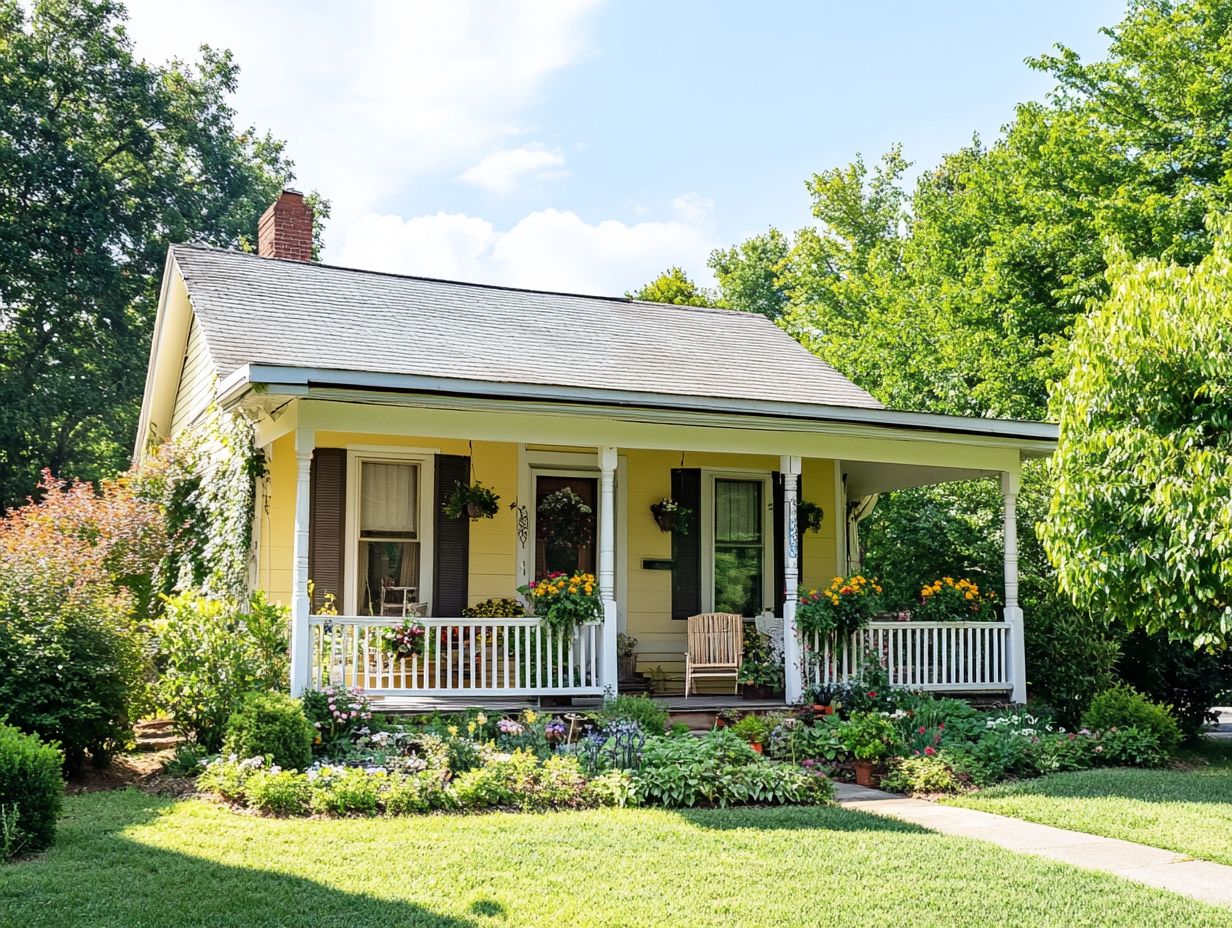
Considering the potential for future growth in your chosen location is crucial for getting the best value from your home. Factors like how much your home could increase in value, the current housing market, and community relationships can significantly influence your exit strategy.
To understand market trends, explore local economic indicators, demographic shifts, and recent property sales data. Using online resources and attending community meetings can provide valuable insights into the area’s future trajectory.
Building strong community relationships fosters a supportive environment and attracts buyers who value a sense of belonging. Over time, these connections lead to enhanced neighborhood services, improved safety, and increased property values.
This is particularly advantageous for homeowners looking to sell or refinance in a competitive market.
5. Resale Value
Understanding the resale value of your home is crucial, especially if you’re considering it as a starter home. Factors like resale potential and current market trends can influence your initial investment and future financial decisions.
By evaluating these elements, you can make a smart purchase that pays off when it s time to sell. Analyzing local market trends highlights up-and-coming neighborhoods where demand is rising.
For first-time buyers, it s essential to recognize that effective seller concessions can boost or undermine a property’s appeal later. A thoughtful assessment of these factors significantly impacts your return on investment, so approach the home-buying journey with a long-term resale perspective.
What Is a Starter Home and Why Should You Consider Buying One?
A starter home is often your first property, serving as a gateway to your dream home. It s an attractive choice for first-time buyers eager to establish a foothold in the real estate market.
Options like FHA and VA loans make homeownership more accessible, enhancing your journey. These homes typically offer modest square footage and fewer amenities, easing any intimidation you may feel as a budget-conscious buyer.
This approach allows you to enter the housing market without overwhelming financial pressure. A starter home is not just a place to live; it can also be a valuable asset that appreciates over time.
By beginning your homeownership journey with such properties, you position yourself to leverage your initial investment later. This paves the way for upgrades to larger homes as your financial situation improves.
What Are the Pros and Cons of Buying a Starter Home?
Buying a starter home can be an exciting journey for first-time buyers. It also brings financial obligations, ongoing maintenance demands, and an emotional shift from renting to owning.
One of the most appealing aspects of investing in a starter home is the lower purchasing costs compared to larger properties, making it an attractive entry point into the real estate market. You ll enjoy location flexibility, allowing you to choose neighborhoods that might otherwise be out of reach for bigger homes.
However, keep an eye on potential renovation costs, which can escalate quickly if the property requires significant updates or repairs. What initially seems like an affordable deal can transform into a financial burden.
The limited space in these homes may not be sufficient for growing families, potentially leading to future relocation.
What Are the Common Features of a Starter Home?
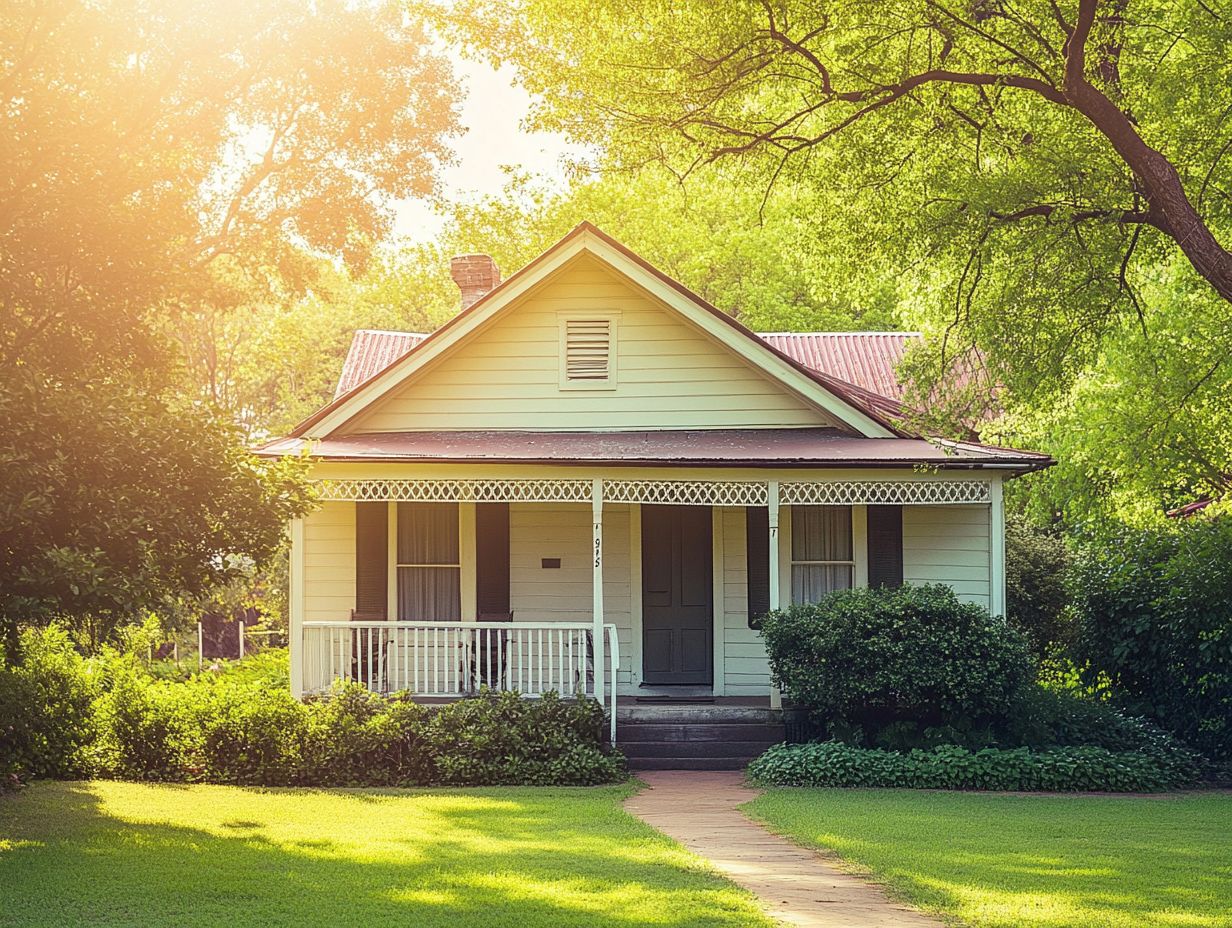
Starter homes typically embody features tailored to meet the needs of first-time buyers. They prioritize practicality and affordability while ensuring a comfortable lifestyle that aligns with your financial stability. Following the 5 steps to a successful home purchase can help you make informed decisions during this process.
These homes often feature efficient layouts that maximize usable space, usually ranging from 1,000 to 1,500 square feet. Positioned in emerging neighborhoods, they offer convenient access to essential amenities like schools and parks, making them particularly appealing for young families.
Many starter homes boast open-concept living areas, fostering a sense of community and togetherness. These elements enhance daily living and enable you, as a first-time buyer, to make wise investments in properties that have the potential for future appreciation. This aligns seamlessly with your aspirations for long-term growth.
How Can You Determine If a Starter Home Is Right for You?
Determining whether a starter home aligns with your personal goals requires careful consideration of various factors. This includes your emotional perspective, potential exit strategy, and the mortgage options available to you. Additionally, understanding the must-have features for your first home can ensure you make a well-informed decision.
It s essential to examine your lifestyle needs. Consider how close you want to be to work, schools, or community amenities that resonate with your interests. Future plans, like expanding your family or pursuing career shifts, play a significant role in assessing whether this property suits your long-term aspirations.
Your financial capabilities are equally crucial. Understanding your budget, savings, and any existing debts will help you gauge what you can truly afford.
To streamline this process, create a checklist that includes essential questions such as:
- What are my must-haves in a home?
- How long do I plan to stay in one place?
This structured approach enables you to navigate the housing market with confidence.
What Are the Steps to Take When Buying a Starter Home?
Navigating the journey of purchasing a starter home involves several essential steps that can significantly ease potential financial hurdles. From securing mortgage pre-approval, which is a loan to buy a home, to conducting thorough home inspections and grasping closing costs, each step is pivotal.
Understanding these stages arms you with the necessary knowledge and enables you to make well-informed decisions.
- First, meticulous preparation lays the groundwork. By creating a budget and prioritizing your needs, you can steer clear of overspending.
- Once you explore financing options and obtain pre-approval, the exciting hunt for your ideal property begins, allowing you to focus on homes that truly align with your criteria.
- It’s vital to carry out comprehensive inspections to uncover any hidden issues that may result in costly repairs down the road.
- As you move into the closing phase, being fully aware of all associated costs will help you avoid unpleasant surprises, ensuring a seamless transition into homeownership.
How Can You Make the Most of Your Starter Home Investment?
Making the most of your starter home investment requires a blend of strategic home maintenance, cultivating community relationships, and consistently keeping an eye on property values. This approach helps your investment appreciate over time and provides emotional support as you transition into homeownership.
To achieve this, regularly tackle essential tasks like checking for water leaks, maintaining clean gutters, and investing in energy-efficient upgrades. These efforts can lower your utility bills and make your home more attractive to future buyers.
Engaging with local organizations, attending neighborhood events, and fostering connections with your neighbors can strengthen community ties, often leading to enhanced property values.
Developing a long-term maintenance plan that includes seasonal inspections and necessary repairs will safeguard your home s structural integrity and amenities, ensuring it remains a valuable asset for years to come.
Frequently Asked Questions
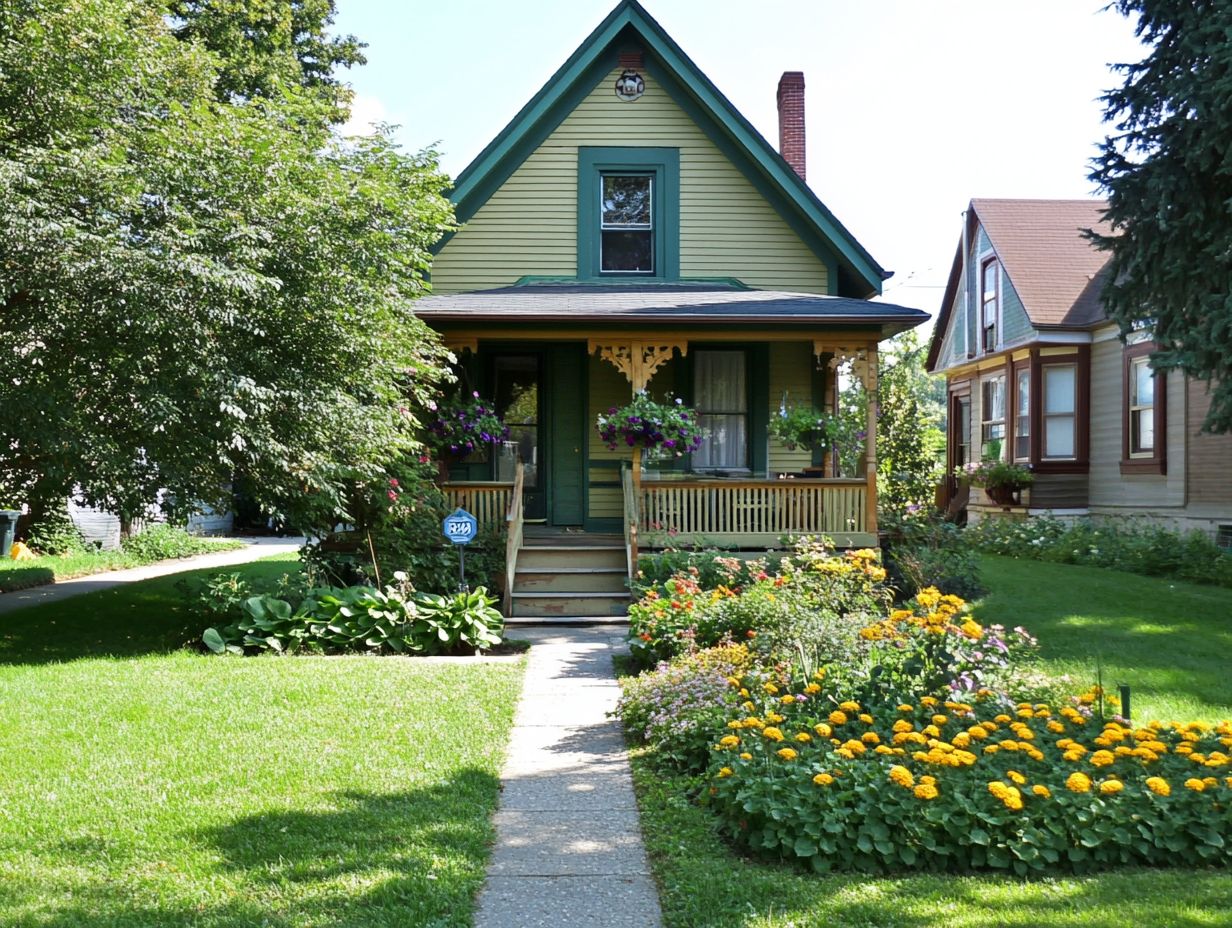
Have more questions? Reach out to a real estate agent for personalized advice and insights!
What are the 5 key factors to consider when looking for a starter home?
Finding your starter home is an exciting journey! Consider five key features of a first home: location, budget, size and layout, future expansion opportunities, and essential features that make a home comfortable.
How important is location when choosing a starter home?
Location is essential for finding a starter home. Choosing a safe, convenient neighborhood with good schools and access to public transport can greatly benefit first-time buyers. For more insights, check out 5 local real estate trends for first-time buyers.
What should I consider for my budget when buying a starter home?
Be realistic about your budget when searching for a starter home. This includes not just the purchase price but also property taxes, insurance, and maintenance costs.
Why is the size and layout of a starter home important?
The size and layout should fit your current needs. Additionally, ensure there s potential for future growth, like adding more rooms or expanding your living space.
How can I determine the potential for growth in a starter home?
Research the local real estate market for signs of growth. Look for new developments, job opportunities, and a thriving economy. Consulting with a real estate agent can provide valuable insights.
What amenities should I prioritize in a starter home?
Essential features in a starter home include a functional kitchen, at least one bathroom, and a dedicated bedroom space. For first-time buyers, knowing what to look for in your first home can also help identify other desirable amenities, such as a backyard, garage, or updated appliances.


